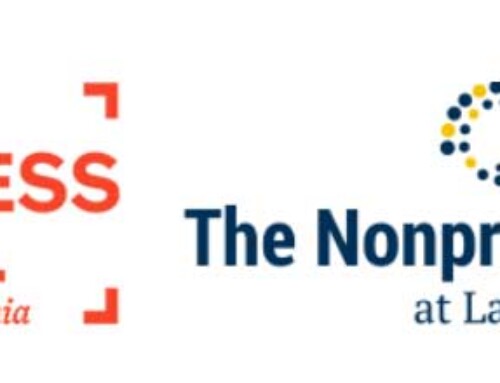On February 4, 2021, the Arts + Business Council put on Defining Innovation Presents Adam Grant, in conversation with Luvvie Ajayi Jones, a sold-out virtual event that drew over 1,000 registrations, sponsored by Pariveda Solutions, Fair Trade Outsourcing, SEI, FS Investments, Odessa, TD Bank, and Dale Carnegie.
Grant, an organizational psychologist, top-rated Wharton professor, and four-time New York Times best-selling author elaborated on the thoughtful advice shared in his latest release Think Again: The Power of Knowing What You Don’t Know, in which he challenges widespread business practices and pushes leaders to question long-held opinions that no longer serve their organizations while helping their teams to do the same. Grant and Jones, also a renowned speaker and author of soon-to-released book Professional Troublemaker: The Fear Fighter Manual, spent the hour-long event discussing where their books converge, exploring topics like imposter syndrome, humility, and surrounding ourselves with people that challenge the status quo and encourage us to be better.
For an event jam-packed with insights, we share our five biggest takeaways.
#1: The world needs more imposters and less armchair quarterbacks.
Grant shared that when we take imposter syndrome, the feeling that one isn’t good enough or is undeserving of their success, out of “syndrome land,” we’re able to see it as an everyday struggle that everyone encounters, and one that can fuel success. When we use feelings of self-doubt as an opportunity to rethink what we’re doing, we can actually accomplish more.
For the armchair quarterback, however, their “confidence exceeds their competence,” according to Grant. Jones noted a common place where this plays out is in LinkedIn headlines, where people can be seen referring to themselves as visionaries, pioneers, and trailblazers: “Visionaries don’t have to wear it on their T-shirts.”
#2: Be humble.
“Humility is often misunderstood. It’s not a matter of having low self-confidence. One of the Latin roots of ‘humility’ is ‘from the earth.’ It’s about being grounded … recognizing that we’re flawed and fallible,” Jones quoted Grant from his new book, followed by her own advice that being humble doesn’t mean diminishing your gifts or talent. It’s about understanding all of the external circumstances that contributed to those gifts to allow you to show up in the world.
As an organizational psychologist, Grant noted that he often sees entrepreneurs and start-up founders struggle with humility and the inability to listen to critics. Oftentimes, founders succeed despite naysayers, but rather than attribute their success to talent, luck, or knowledge in one specific area, they overgeneralize and believe success stems from bold thinking and a disregard for others’ opinions.
#3: Avoid the roles of preacher, prosecutor, and politician in your everyday life.
Noting a lot of the political and social turmoil over the past several years, Grant concluded that there’s danger in when we drill heavily into our positions and are unwilling to even consider changing our opinions.
“We spend so much time in the mindset of preachers, prosecutors, and politicians. And I saw a lot of preaching and a lot of prosecuting, the ‘I’m right, you’re wrong, and I’m trying to change your mind, but I get to stand still and freeze in my beliefs.”
To avoid falling deeper into those roles, Grant and Jones both agreed that we all need to make an effort to go out and engage with people that challenge our conclusions, run our own experiments, and learn about the parts of the world we don’t know — simply, be curious.
#4: Who you are should be a question of what you value, not what you believe.
Values are your core principles in life, like generosity, freedom and fairness, security, or integrity.
For Grant, basing your identity on your values allows you to remain open-minded about the best way to to advance them. Having a sense of identity and authenticity is crucial, but the goal should also be to evolve and grow.
#5: Find your challenge network.
Finally, Jones and Grant explored the impacts of being agreeable versus disagreeable.
Grant defined being agreeable as being polite, friendly, warm, and “Canadian,” while being disagreeable can be equated to being critical, skeptical, and challenging.
Being disagreeable isn’t necessarily a bad thing in the context of Grant and Jones’ conversation. In fact, the authors suggested we all identify groups of people in our lives to tell us the truth, call us out, and challenge us because they care — our own challenge networks.
We should challenge our friends and loved ones, too. Being a part of a challenge networks is as essential as identifying your own. Jones offers three questions you can ask yourself when you want to challenge someone:
- Do you mean what you’re about to say?
This challenge that you’re about to put forth, do you mean it, or are you just being a contrarian for the sake of being contrarian? - Can you defend it?
Can you show them receipts, data, or evidence for your challenge? - Can you say it thoughtfully?
Your messaging matters.
If the answer is yes to all three, put forth the challenge.














Leave A Comment